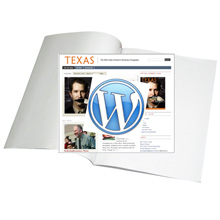As you probably know, I’ll be hosting “Start the (Word)Presses: How to create the online version of your print magazine or newsletter with WordPress” next Thursday (Jan 21st).
 I designed this 2-webinar series to help magazine editors get a good and practical understanding of how WordPress can help them create an easy-to-produce online version for their print publication.
I designed this 2-webinar series to help magazine editors get a good and practical understanding of how WordPress can help them create an easy-to-produce online version for their print publication.
But, “why should magazine editors and writers use WordPress in the first place?” some of you might ask.
Here are my top 4 reasons:
WordPress is an online publishing platform
Yes, this one sounds obvious. However, it’s important to state that WordPress has been designed to publish timestamped articles that can be categorized and tagged with meta data (articles which are usually called blog posts). While publishing an online magazine requires a special kind of themes (i.e design templates) to break away from the blogging format – where everything is presented in reverse chronological order, many of these themes are now available for free or a fee. A knowledgeable web designer can also design a brand new customized theme.
As a result, many big and small online magazines are powered by WordPress in higher education and elsewhere.
WordPress offers several options when it comes to web hosting
Since it runs with PHP and MySQL, WordPress cannot work out of the box on any campus server (requirements for the latest version of WP can be found online). However, it can run on many servers (even on Windows servers although this requires a work around for rewriting web addresses produced by WP).
Your IT folks don’t want to hear about WordPress on THEIR servers? No problem, you can actually get a web hosting shared account and ask the person in charge of your DNS to help you set up a sub-domain such as magazine.universitydomain.edu that will point to your shared account IP address. It might sound complex, but it is really easy and quick to implement.
The person in charge of the DNS isn’t cooperative? No problem, you can decide to buy a domain name for your magazine and use it when you set up your web hosting shared account or even use wordpress.com as your web host and buy an upgrade to use your own domain name.
WordPress is simple and easy to use… and to customize
Once everything is set, adding and editing articles is a breeze. No need to know (or remember) your HTML as WP comes with a WYSIWYG editor that won’t scare the editorial team. Add a headline and the body of the article, pick the category and select a few tags… and you’re done.
With the different roles that can be assigned to your WP users, you can even simplify the backend for your editors or writers by showing them only the options they need.
Depending on your theme, you can also easily add a search box, republish the content of an RSS feed, a bit of text or HTML by using bundled widgets that can be just dropped into different areas of your theme.
WordPress is really a MULTIMEDIA publishing platform
Want to add pictures to your articles? No problem, you can upload them ahead of time or as you write (or paste) the text of your article. You can even perform some basic editing on your pictures within WordPress.
Want to add a YouTube video? With WP 2.9 and above, you can just paste the web address of the video and WordPress will take care of the rest.
Want to add an audio file, a photo gallery or slideshow? Several WP plugins can help you do it with just a couple of clicks.
Do YOU use WordPress for a magazine?
Tell us why you chose it by posting a comment!




[…] CollegeWebEditor has a good post on WordPress today: Why should magazine editors and writers use WordPress in the first place? […]
[…] Web Editor: Why use WordPress for the online version of your college magazine? (January […]